What kind of human food can cats eat?
You are chilling in the living room, munching on a snack. Your cat appears on the scene, begging for a bite, but you are not sure if it is safe to give your food to your cat. So what kind of human food can cats eat?
To help you out, we have put together a list of human foods that you can safely give your cat as an occasional treat. However, always remember that the bulk of your cat’s diet should be top-quality cat food with high nutritional value.
If you are asking yourself what kind of human food can cats eat, below are several options:
1. Meat

Cats are true carnivores, and their protein requirement is high. Simply put, they are meat-eaters, and the protein from meat is required for a healthy heart, good eyesight, and a robust reproductive system.
You can give your cat small quantities of cooked turkey, beef, chicken, and lean deli meats.
Please don’t give them raw or spoiled meat as it can make them sick. Don’t give your pet anything that you wouldn’t eat yourself.
Avoid high in sodium meat, as excess amounts of salt can be toxic to your cat.
2. Fish
Feeding oily fish like tuna, mackerel, or salmon is good for your cat’s eyesight, joints, and brain. Salmon is a source of protein and omega-3 fatty acids.
Avoid giving raw fish; it’s best to feed your cat boiled, baked, or grilled fish. Don’t cook the fish in garlic, spices, or excessive amounts of oil.
3. Fish Oils
The omega-3 fatty acids in fish oils, including salmon and cod liver oil, helps to prevent dryness of skin in your cat and promote the health of your cat’s coat.
4. Cheese
Cheese is rich in protein and is okay for your cat as long as it’s in small amounts. Most cats cannot tolerate dairy products, so cheese should only be an occasional treat. It is best to skip milk altogether to prevent your cat from having an upset tummy.
5. Banana
You can give bananas to your cat but only as an occasional treat because of the high amount of sugar present.
6. Berries
Blueberries and strawberries are good for your cat as they are high in antioxidants and low in sugar.
7. Melon
Small bites of cantaloupe, seedless watermelon, and honeydew are okay for your cat due to the high vitamin A and C content.
8. Carrots
Carrots are a suitable snack for your cat though they don’t necessarily need to eat vegetables.
However, make sure that you give cooked carrots. Raw carrots can be dangerous due to choking hazards.
You can also give carrots as a snack to cats that are obese.
9. Rice
A bit of rice is okay for your cat and can be beneficial if your cat has any digestive problems.
10. Pumpkin
Pureed pumpkin without added sugar or spice can be helpful if your cat is having diarrhea or constipation. The fiber and nutrients in the pumpkin are good for your cat.
11. Oatmeal
The fiber, iron, and protein in oatmeal are good for your cat. It is also suitable for treating skin problems in your cat.
12. Eggs
You can give your cat cooked eggs as they are a rich source of protein. Avoid raw eggs, which carry the risk of salmonella or E. coli.
Some cats can be allergic to eggs, so give them a little bit first to avoid allergic reactions.
13. Spinach
Cats like to chew on grass, so spinach is a good option due to its high vitamin content. Don’t give spinach to cats that have kidney or urinary issues.
14. Green Beans
Green beans are safe for cats. They are high in fiber, proteins, and vitamins.
Fiber-rich foods can cause gastrointestinal (GI) or digestive disorders in cats, so make sure to introduce them only gradually.
Avoid canned green beans; use fresh and organic green beans.
15. Peas
It is okay for cats to eat peas, which are a source of carbohydrates and proteins. It can also be an exciting treat for cats.
16. Bread
Bread is okay for cats as it is a good source of protein and fiber.
17. Apples

Apples are okay for cats. They are rich in fiber and vitamin C. However, make sure to give your cat apples without skins. Also, avoid seasonings when feeding any human food to cats, including apples.
18. Cabbage
Small pieces of cooked cabbage are okay for cats, and they are known to be good for skin, coat, and digestion.
19. Cauliflower
Cats can eat small quantities of cooked cauliflower which has vitamins and antioxidants and also aids with digestion.
20. Potatoes
Cooked ripe potatoes in small quantities are okay to give cats.
21. Broccoli
Broccoli can supply your cat with vitamin C and fiber. You can give broccoli to your cat if she likes it.
22. Yogurt
Yogurt is safe as the lactose is already broken down, unlike other dairy products.
Your cat can benefit from the protein, calcium, and probiotics in yogurt. However, give your cat only plain yogurt made of whole milk and free of artificial flavors or sweeteners. Give only small quantities to prevent gastrointestinal issues.
23. Cake
Cake is safe for cats as long as there is no chocolate. However, it is not something that you should be giving your cat on a regular basis. Vanilla icing on cake is also okay for your cat as it contains oil or lard and powdered sugar. Carrot cake is also okay.
Though cake may not be toxic it is not really something you should be feeding your cat. However, if you happen to drop some cake on the floor and your cat happens to gulp it down, you can rest knowing that your cat will be okay.
Also remember that cats cannot taste sweet, so they are not exactly going to enjoy it as much as you do. Compared to more than 9000 taste buds in humans, cats have around 473, hence the difference in taste.
24. Pasta
Pasta is safe for cats if served alone. The basic ingredients of pasta such as flour, water, and eggs are not necessarily harmful to cats. Like all other human foods mentioned, it is okay to give a small quantity as an occasional treat. Be cautious of pasta that is served with sauce or has other ingredients such as onion, garlic or other spices.
25. Popcorn
Popcorn is both safe and unsafe at the same time. I am not trying to confuse you. Popcorn on its own is not toxic to cats but it can pose a chocking hazard for cats and cause health problems due to the presence of salt and butter.
Will there be a problem if your cat gobbles up a fallen popcorn from the floor? It probably won’t cause any problems.
Foods you shouldn’t give your cat:
Avoid giving your cat the following items, which are toxic:
- Chocolate
- Grapes
- Raisins
- Onions
- Garlic
- Alcohol
- Green tomatoes
- Raw green potatoes
- Avocado
Can cats eat pork?
You can give small portions of cooked pork or ham to your cat; make sure to remove bones.
Can cats eat raw chicken?
Don’t give your cat any raw meat, including chicken or fish. Uncooked meat or eggs carry the risk of salmonella poisoning or e coli.
Can cats drink milk?
Many cats are lactose intolerant, which means dairy products upset their tummy. Please don’t give your cat cow’s milk as it has lactose. Once kittens are weaned, their ability to digest lactose is reduced.
Cats’ that are fed milk may experience the following conditions:
- Diarrhea
- Vomiting
- Stomach pain
- Bloating
- Gas
- Constipation
Can cats eat chocolate?
Milk and theobromine (an ingredient in cocoa) are not suitable for a cat.
Theobromine is poisonous for cats and can cause liver failure.
If your cat has consumed chocolate, it may exhibit the following signs:
- Restlessness
- Vomiting
- Diarrhea
- Increased rate of breathing
- Increased heart rate
- Heightened temperature
- Seizures
- Muscle rigidity
If your cat has digested chocolate and is showing any of the above symptoms, contact your vet immediately.
How to prevent cats from eating harmful foods?
The best way to prevent your cat from eating human food is simply to keep such food out of your cat’s reach.
Follow these guidelines if you decide to give your cat human food:
- Give human food to your cat only as an occasional treat and that too in minimal quantities to avoid gastrointestinal issues or nutritional deficiencies.
- Don’t give your cat spoiled or rotten food; anything you wouldn’t eat yourself shouldn’t be given to your cat.
- Avoid giving raw food to your cat; if it’s raw that you wouldn’t eat, avoid giving it to your cat.
Can cats eat onions?
Please don’t give your cat onions or garlic as it can lead to digestive problems. If your cat eats many onions, it can damage his red blood cells and lead to anemia.
Can cats eat liver?
Feeding your cat minimal amounts of liver is okay, and that too occasionally. Large quantities of liver can cause vitamin A toxicity in your cat and damage your cat’s skeletal system, leading to osteoporosis and bone deformities.
Can cats eat crab?
Crabs are rich in protein, Vitamin D, and Omega 3 fatty acids. Small portions of crab meat are okay for your cat if she is not allergic to shellfish. Avoid giving her too much.
Conclusion
Cats can eat certain types of human foods but you should be careful. Some human food can make cats fat, sick or even poison them.
Even if the food is in the safe list, make sure to give it only as an occasional treat. If in doubt, consult your veterinarian. For more information, check out ASPCA’s list of human foods to avoid feeding your cat.
You should always feed your cat the right quantity of a high quality cat food. For details of how much to feed your cat, check out our article: How much do you feed a cat? Everything you should know






